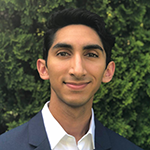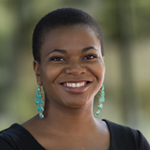Here is what our grads have to say about the Summer Institute. Also see Seeding the Field: HMS summer bioinformatics program builds careers, improves health care.
Year of Participation: 2025
Eunice Lee
Undergraduate Institution: Duke University
Major: Statistical Science (Concentration in Data Science)
Currently: Senior
Contact: yl888@duke.edu
It’s a surreal feeling to attend the live demo of an AI clinical diagnosis model then find it featured in The New Yorker a month later, or to recognize a research project conducted by your neighboring lab show up in your own college lecture. In SIBMI, you are seated in the very front row of state-of-the-art biomedical informatics. I recall our first day, when Susanne described each lecture as a “knowledge dump” from world-class leaders. Looking back, I couldn’t agree more – even hearing from one of these speakers would have been remarkable, but the privilege to ask questions and receive practical advice from DBMI faculty, Broad directors, Longwood hospital chief officers, and biotech startup innovators week after week was truly special.
Incubating my own project under the guidance of Dr. Nils Gehlenborg (PI) and Dr. Eric Mörth (primary mentor) at the HIDIVE Lab was an incredible experience. Over the summer, I developed a Python package for cell-cell interaction analysis through surface-based neighborhood graph construction and intercellular volume computation in 3D spatial omics. The challenges that came with tackling high-throughput visual data at scale sharpened my technical skills, and weekly all-hands meetings opened the floor to present progress and exchange feedback on optimization strategies for our methods. There were always more ideas stemming from excitement than the hour could contain, and I’m deeply grateful to Nils, Eric, Morgan, and the spatial biology team for their dedicated day-to-day mentorship. This collaborative spirit extended beyond our group; to gather insights on the pathological utility of my framework, we would simply walk over to neighboring departments of HMS and learn from their wet-lab lens of expertise. By the end of the program, the sense of belonging I found in HIDIVE was far beyond the typical dynamics of a workplace – and one that still shapes my experience today, as I continue onboard with the team.
SIBMI was a pivotal turning point in my academic steps. With a structured lecture series that stretched my understanding of the field’s future trajectory paired with invaluable mentorship and resources to explore a focused niche, we were granted a thoughtful balance of breadth and depth to grow tremendously in a short timeframe. I left the program with a clearer sense of direction; seeing how computational approaches drive real impact for patients fueled a deeper responsibility for my professional aspirations in this intersectional field. And of course, the people made the place – from whale watching weekends to late-night lobby gatherings over donuts, it was our tight-knit cohort I spent every hour with that made Boston feel like home. I owe a huge thank you to Susanne, Jamie, and our TA Thomas for their sustained dedication. As someone who could talk for hours about what SIBMI has to offer, I’d love to be a point of contact for anyone curious to learn more. Please don’t hesitate to reach out – let’s chat!
Simran Kaur
Undergraduate Institution: Boston University
Major: Biomedical Engineering (Concentration: Machine Learning)
Currently: Senior
Contact: simk@bu.edu
Being part of the SIBMI 2025 program was an incredible experience. A summer filled with engaging lectures, valuable career guidance, and fun social activities would not have been possible without Susanne, Jamie, and our TA Thomas. This unique opportunity allowed me to explore the intersection of computational research and biomedicine through cutting-edge projects and thoughtful discussions with both lecturers and my fellow cohort members.
This summer, I was introduced to the world of rare diseases under the mentorship of Dr. Shilpa Nadimpalli Kobren. Coming into the program with limited computational medical experience, I quickly became familiar with medical claims data and healthcare codes. In our pilot study, we applied anomaly detection methods (unsupervised machine learning) to claims data with the goal of identifying pediatric neurology patients who may have rare or undiagnosed diseases. The ultimate vision of this project is to preemptively flag such patients for diagnostic interventions. Beyond providing me with a new way of approaching healthcare data, this project also gave me a deeper perspective on the diagnostic odyssey faced by rare disease patients and their families. I am excited to continue this project post-SIBMI!
Another truly rewarding aspect of the program was the weekly lecture series. Each week, we heard from a diverse set of speakers, principal investigators, post-docs, start-up founders, physician-scientists, and more whose work highlighted the many ways computational research advances biomedicine. The research was fascinating, but what resonated most were their personal stories about pursuing an MD, PhD, and the realities of those paths. Their honesty and insight reaffirmed my interest in pursuing a PhD and gave me perspectives I will carry with me as I move forward.
Overall, SIBMI has been one of the most impactful experiences I've had, both professionally and personally. For anyone interested in the life sciences and computational research, I recommend SIBMI. Please feel free to reach out if you'd like to hear more about my experience, or if you have any questions!
Hue Ahnn
Undergraduate Institution: University of California, Berkeley
Major: Bioengineering, Electrical Engineering and Computer Science
Currently: Junior
Contact: hueahnn@berekely.edu
SIBMI 2025 was truly a transformative experience for me.
As someone passionate about both biology and computer science, I had been searching for a way to meaningfully combine my interests. SIBMI provided me the opportunity to fully immerse myself in bioinformatics, a field that perfectly bridged my interests. This past summer was a pivotal chapter in my academic journey, giving me the confidence and clarity to pursue my future career ambitions.
The people you meet at SIBMI are extraordinary. From guest lecturers to professors to fellow students, everyone brought an infectious passion for their work that made the environment both inspiring and motivating. Before this summer, I was very uncertain about my post-graduation plans. Through my research project, I realized how much I enjoy scientific discovery and I am now more certain about pursuing a PhD. Over nine weeks, I completed my first independent project, investigating insertion sequence mediated heterodimerization events and their role in spreading antibiotic resistance genes. With guidance from Kepler Mears in Professor Michael Baym's lab, I built a pipeline from scratch, gained independence as a researcher, and found the clarity I needed to envision a career in graduate level research. The mentorship I received from Kepler, Arya and the entire Baym lab was invaluable. They were welcoming, supportive and always willing to help.
Equally meaningful were the friendships I formed with the other students in the program. Although I came to Boston from the West Coast not knowing a single person, I left with a community I'll treasure for years to come. From late-night coding sessions to kayaking on the Charles and exploring Boston's food scene, the memories I made are ones I wouldn't trade for the world.
If you're passionate about biological and quantitative sciences, or if you're uncertain about what path to take after undergrad, I cannot recommend SIBMI enough. The opportunities and growth it offers are life changing. Please feel free to reach out if you'd like to hear more about my experience!

Himani Yarlagadda
Undergraduate Institution: Harvard College
Major: Applied Mathematics (in Biological Sciences)
Minor: Global Health and Health Policy
Currently: Junior
Contact: himani_yarlagadda@college.harvard.edu
This past summer, being in the 2025 SIBMI cohort proved to be one of the most enriching and defining moments in my academic career. During the program, I had the opportunity of working under the wonderful mentorship of Dr. Maha Farhat and Shandu Mulaudzi. My project focused on analyzing a dataset of sequenced Mycobacterium tuberculosis culture isolates from patients in order to elucidate patterns in low-frequency variants and discover potential connections to clinical characteristics. The opportunity to work on this project allowed me to integrate a passion for global health and computational methodology in a way that I had never encountered before. Over the summer, I came to realize how powerful these approaches can be in tackling persistent global health challenges. In the lab, I was fully encouraged to explore my own curiosities and think creatively, and at every step of the way, I was met with truly exceptional mentorship and support that pushed me to not only dive deeper into the project but also to grow as a student researcher.
I want to emphasize that SIBMI is not just a research program. It is an ecosystem where you meet incredible mentors in the field, challenge the future of computation and medicine, and do so alongside a cohort of diverse and driven peers that inspire and motivate you daily, and this community does not just end once the summer is over. Through the weekly program seminars, I gained valuable perspectives on how medicine is co-evolving with advances in computation and technology from leaders in the field. More personally, each of these opportunities fundamentally shaped how I envision the rest of my academic journey. I want to give my sincerest thanks to everyone who makes SIBMI possible, especially Susanne, Jamie, Thomas, the Farhat lab, and the entirety of DBMI. SIBMI has transformed how I view computational methods for medicine and motivated me to delve into these questions further. I would highly recommend this program to anyone who is interested in answering how medicine interplays with developing technology: if you have any questions, please feel free to contact me! I would be more than happy to help in any way I can!
Year of Participation: 2024
Anushka Poddar
Undergraduate Institution: University of Maryland, College Park
Undergraduate Institution: University of Maryland, College Park
Major: Bioengineering
Currently: Sophomore
Contact: apoddar2@terpmail.umd.edu, anushkapoddar76@gmail.com
SIBMI 2024 was one of the most impactful and memorable experiences of my academic career thus far. I arrived in Boston as a wide-eyed freshman with many doubts about whether I wanted to pursue a career in research, clinical practice, or both. But over 9 weeks, I refined my career goals, gained immense exposure to contemporary issues in biomedical informatics, improved my research skills, and met some of my best friends. I am deeply grateful to Dr. Susanne Churchill and Jamie Gunnerson for their tireless efforts in making this program possible.
I was placed with the Farhat Lab, and conducting research under the guidance of Dr. Maha Farhat was truly a privilege. Through my project on genetic determinants of extrapulmonary tuberculosis, I learned how to think critically about genome analysis and apply genomics techniques. But perhaps more importantly, I developed confidence in leading my own project, learning independently, navigating setbacks, and presenting my work to different audiences.
The mentorship I received at SIBMI was also invaluable, and among the brilliant, close-knit DBMI community, I felt constantly seen and supported. Weekly lectures and lunches from distinguished researchers and clinicians provided a unique window into the intersection of medicine and computer science, as well as the multitude of career opportunities in this field. Conversations with Dr. Farhat, Susanne, and other members of the department also enriched my perspective and helped me gain clarity about the path I want to pursue after graduation.
The cohort is what made the summer particularly special for me. Being surrounded by peers from around the country who were equally passionate and driven was truly inspiring. And after long days at Countway, we wandered the city and gathered in apartments, sharing food, conversations, and laughs. I am glad to say that the friends I made at SIBMI remain some of my closest friends today.
Overall, SIBMI opened my eyes to the breadth of biomedical informatics and strengthened my resolve to contribute to this exciting field. I highly recommend the program to any student who is interested in using computational techniques to advance health and medicine. If you’re thinking about applying or have any questions, please do not hesitate to reach out—I’m happy to share my experience and help however I can!
Aryan Shaik
Undergraduate Institution: Texas A&M University
Undergraduate Institution: Texas A&M University
Major: Bioinformatics
Currently: Junior
Contact: aryanshaik@tamu.edu
Participating in the 2024 SIBMI program has been one of the most transformative and rewarding experiences of my academic journey. This unique opportunity allowed me to immerse myself in the exciting intersection of medical and computational research, equipping me with invaluable skills and a clearer sense of direction for my future. During the program, I had the privilege of working under the guidance of Dr. Maha Farhat and an exceptional team of mentors, including Dr. Brendon Mann, Max Marin, Haoyang Hu, and Shandu Mulaudzi. My project focused on analyzing a novel dataset of paired genomes and metagenomes of Mycobacterium tuberculosis directly obtained from patient samples with and without intervening culture. This deep dive into tuberculosis research not only broadened my understanding of computational biology but also revealed the potential of interdisciplinary approaches to address critical challenges in global health.
One of the most rewarding aspects of the program was the creative freedom I was given to explore ideas within the project’s framework. Balancing computational methodologies with the tangible implications of medical research was an incredible experience that fueled my passion for blending these two fields. Whether brainstorming innovative approaches or troubleshooting challenges, I always felt supported by my mentors, whose expertise and encouragement played an instrumental role in my growth. Beyond the research, SIBMI provided an environment of collaboration and inspiration. Interacting with fellow participants—brilliant, motivated peers from diverse backgrounds—was a highlight of the summer. The cohort’s energy, curiosity, and camaraderie created an inspiring environment that fostered meaningful connections and collaborative growth. I would also like to extend my heartfelt thanks to the entire program, especially Susanne, Jamie, our TA Shandu, the Farhat Lab, and the entire DBMI staff, whose dedication made this summer productive and incredibly memorable.
SIBMI 2024 has left a lasting impact on both my academic and personal journey. It has deepened my appreciation for the synergy between medicine and computation and reaffirmed my aspirations in this field. I highly recommend this program to anyone curious about how computational approaches can revolutionize medicine. If you’re considering applying or have any questions, please feel free to reach out, as I’d be more than happy to share more about my experience and help in any way I can!
Anya Sharma
Undergraduate Institution: Pitzer College
Undergraduate Institution: Pitzer College
Major: Biology
Minor: Data Science
Currently: Senior
Contact: asharma@students.pitzer.edu
Participating in SIBMI was by far the most impactful summer of my academic career, and I owe a huge thanks to Susanne Churchill, JamieGunnerson, Shandu Mulaudzi, and especially my PI and mentor, Arjun Manrai. This summer, I tackled scalable mitigation strategies for addressing race-based medicine propagation in Large Language Models. It was a chance to explore a vital aspect of clinical AI deployment—one that I’m now deeply passionate about and plan to pursue further in graduate school. Currently, I’m still engaged with the lab, working to expand the project through a collaboration with Beth Israel, and we’re aiming for a possible publication.
Although I’m not on the MD or PhD track, the SIBMI program was incredibly enriching. Weekly talks from guest lecturers not only gave insight into various research areas and career paths (MD, PhD, MD-PhD, MS, and more), but also helped me build valuable connections within the industry. One of the lectures even led to a future opportunity that I’m planning on pursuing next summer!
Working alongside graduate students in the lab was another highlight. Kyla Gabriel, a past SIBMI student herself, offered me guidance on everything from project work to career advice, making me feel supported throughout my time there. Most importantly, the close-knit community within the SIBMI cohort gave me friendships with like-minded peers who share similar academic and career goals, and I’m excited to keep in touch with them as we all move forward in our careers.
Richard Zhu
Undergraduate Institution: Harvard College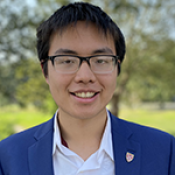
Undergraduate Institution: Harvard College
Major: Statistics and Neuroscience (double major)
Minor: English
Currently: Junior
Contact: rzhu@college.harvard.edu, richardyxz@gmail.com
My summer at SIBMI was a transformative experience that has substantially influenced my research interests and career direction. Coming into the program, I was not sure whether I wanted to pursue an MD, PhD, or MD-PhD. Moreover, I had tried out a variety of computational and wet lab research fields, but I had never delved deeply into deep learning for biomedicine. I came to SIBMI wanting to try out this research frontier and to clarify my career path.
The summer exceeded all of my expectations. The community at Harvard DBMI is extremely tight-knit and, as a SIBMI intern, you have an unparalleled opportunity to interact with and learn from leaders in the field of biomedical informatics. In 2024, we heard from a wonderfully diverse group of physicians, academic researchers, and industry scientists through the lecture series. Each speaker had a unique story to tell about how they chose their research interests and ultimate career path—this was invaluable in helping me define what kind of impact I want to have in my future career. If you are interested in this specific intersection of quantitative reasoning, computational implementation, and biomedical applications, there is no better place to spend a summer than at SIBMI, as you can learn from not just the faculty at DBMI (who are at the forefront of their respective fields) but also leaders across the Harvard teaching hospitals, MIT, affiliated research institutes (e.g., the Broad Institute) and biotech companies in this space (e.g., Recursion). Moreover, Susanne, Jamie, and the program’s TA (shoutout to Shandu!) do a superb job organizing the program and bringing everyone together through socials, lunches with the speakers, and activities around Boston. The program is small enough that you will get to know all the members of your cohort, and these friendships will last beyond the program. Since SIBMI ended, I have gone on hackathons with friends from the cohort, met up with others outside of Boston, and learned an extraordinary amount from my peers.
Regarding the research project itself, I worked in Professor Marinka Zitnik’s lab under Dr. Shanghua Gao. My project, which I am continuing into the academic year, focuses on developing LLM-based AI agents for personalized drug understanding and repurposing. Working on this project allowed me to explore the forefront of biomedical AI agents research and has significantly expanded my perspectives on how computation can be applied in healthcare contexts. Professor Zitnik and Dr. Gao are fantastic mentors that have shown me how to conduct research in this interdisciplinary space and helped me feel prepared for my future research pursuits.
To anyone interested in the field of biomedical informatics or applying/admitted to SIBMI, I am more than happy to answer any questions about my experience in SIBMI. The program has had a profound and lasting effect on my scientific journey, and I would encourage you to apply if you are interested in quantitative thinking and want to make a positive impact in the biomedical space. Please feel free to reach out to me at the listed emails!
Year of Participation: 2023
Kyra Fetter
Undergraduate Institution: University of California, San Diego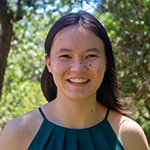
Major: Bioengineering: Bioinformatics
Minors: General Biology and Mathematics
Currently: Junior
Contact: kfetter@ucsd.edu
Wow, what a phenomenal summer! SIBMI has been, hands-down, the most transformative experience for me as someone aspiring to work at the intersection between computation and biomedicine. I highly, highly recommend the program.
The core of SIBMI is the lecture series. By hosting 37 world-class lecturers over the nine weeks, Susanne exposed us to an impressive span of current, cutting-edge work in computation and medicine, from using large language models like GPT-4 in clinical decision making, to environmental exposures and disease risk, biomedical data visualization, and genomic matchmaking for precision medicine. The speakers were eager to get to know us and our interests, and happy to chat about balancing professional science with responsibilities as partners, mothers, and fathers. Post-SIBMI, I feel more sure about where my interests broadly lie in computation and medicine, but I’ve also learned about many new niches in bioinformatics which I am excited to explore.
I feel very grateful for the opportunity to have joined the Manrai Lab this summer. I worked on a project with two other SIBMI students aiming to streamline computational analyses of Chronic Kidney Disease by developing an NHANES dataset and accompanying R package. I then used our platform to examine the clinical implications of dropping the race coefficient from kidney function estimation calculations for regional healthcare systems. My research experience in SIBMI has exposed me to what it means to have independence as a researcher; Dr. Manrai gave us the freedom to take the project in directions we found most exciting. Dr. Manrai was a phenomenal mentor; our group met weekly to discuss our project in addition to 1-1 for career guidance. Likewise, the Manrai Lab community was extremely welcoming and eager to support us. Similar to many other SIBMI interns, we will continue our project into the academic school year.
In terms of growing your professional network, SIBMI is wonderfully located in the biotech hubs of Boston and nearby Cambridge. Throughout the summer, I was able to have coffee chats with graduate students, computational research associates, and postdocs from DBMI at HMS and the Broad Institute to ask questions about their career paths. Now, after reflecting on their advice, I feel more confident in my goal to pursue a PhD after undergrad in bioinformatics.
I also must give a huge shoutout to my SIBMI cohort. It was inspiring to spend the summer with such a motivated, passionate, and brilliant group of people. Susanne and the SIBMI team do a wonderful job at bringing together students with diverse backgrounds and academic focuses–we really learned a lot from each other. Forming lasting friendships over weekend trips to Haymarket for $2 watermelons, whale watching, kayaking the Charles, and late night strolls in Cambridge, I know we will continue to keep in touch for years to come.
I cannot overstate how much of an impact SIBMI left on me, and if you are enthusiastic about the intersection between computation, medicine, bioinformatics, and mathematics, then SIBMI is definitely the program for you. If you have any questions or just want to chat about the program, please do not hesitate to reach out! I am more than happy to help!
Jiayue Liu
Undergraduate Institution: Vanderbilt University
Major: Biological Science (Molecular and Cellular Biology)
Minors: Data Science & Chemistry
Currently: Senior
Contact: Jiayue.liu.1@vanderbilt.edu
SIBMI provided me with an invaluable experience that will indelibly shape my journey as a biology student with a data science background. Working with Dr. Arjun Manrai, an expert in the interplay between machine learning and clinical decision-making, was both enlightening and transformative. Prior to this engagement, the impact a student or emerging data scientist could have on tangible clinical practices and public policy seemed abstract. However, this summer crystallized the reality and magnitude of such contributions.
The core of my summer research work revolved around curating datasets and developing statistical analysis platform, with a specific emphasis on chronic kidney disease (CKD) and cardiovascular diseases. Throughout this process, I was constantly reminded of the significance of meticulous data handling and the potential of well-structured data platforms in driving medical research and informing clinical decisions. Beyond the technical skills honed, this experience heightened my sense of purpose. Observing and being part of a process where technology and healthcare converge to make tangible positive impacts is truly exhilarating. This realization has spurred my enthusiasm to further delve into the domain of precision medicine. Beyond this summer, I will continue working on projects related to the platform development and state-of art AI/ LLMs to accelerate documentation mining and data cleaning.
A standout element of the program was the enriching weekly lecture series. Each week, we had the privilege of delving into the insights of 3-4 eminent professors—spanning from MDs and MD-PhDs to PhDs adept in computer science and life sciences. This immersion offered a panoramic view into the multifaceted world of biomedical informatics, covering a spectrum from electronic health records to genomics to data infrastructure and to deep learning in pathology imaging/drug safety/drug repurposing/protein-protein interactions. Yet, these sessions transcended mere academic exploration. They unveiled the unique life journeys of these accomplished individuals, underscoring the profound truth that success often meanders rather than progresses linearly. Their personal narratives, woven with challenges, triumphs, and invaluable lessons, served not only as a beacon of inspiration but also as a poignant reminder of the resilience demanded in both academic and professional terrains.
The interactive nature of the program, especially the lunch discussions and panels, brought the opportunity to delve deeper into specific topics, ask candid questions, and build connections with these luminaries. Engaging discussions, hands-on workshops, and an atmosphere conducive to the free exchange of ideas emphasized the essence of collaborative learning. The passion in the Lahey room was palpable. Being surrounded by individuals, including extraordinary peers that comes from other institutions, striving to leverage technology to revolutionize patient care and healthcare research was nothing short of inspiring.
Personally, my interactions with SIBMI Director Dr. Susanne Churchill, DBMI Director Dr. Issac Kohanne, Dr. Kun-Hsing Yu, Dr. Marinka Zitnik, and guest lecturer Dr. Matt Might were deeply transformative. Their insights, and personal narratives have profoundly shaped my perspective. Through their stories, I've come to truly appreciate the value of perseverance, innovation, and the unwavering commitment to enhancing the biomedical field, all driven by a genuine passion for bettering patient health.
Looking back, I feel a profound sense of gratitude and fortune. The experience has equipped me, both intellectually and emotionally, to advance my interdisciplinary background and embark on the next phase of my journey in precision medicine. If you have any questions during the application process, feel free to reach out.
Chase Mathis
Undergraduate Institution: Duke University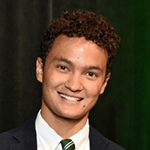
Major: Mathematical Statistics and Computer Science
Currently: Junior
Contact: chase1mathis@gmail.com
This program is truly exceptional, and I highly recommend it to both students with computational/mathematical inclinations, like myself, and those with a more biological/clinical focus.
Dr. Churchill, Jamie, and the entire Department of Biomedical Informatics mentor in a way I haven't encountered before. They prioritize your development as both a researcher and an individual. The program places significant emphasis on guiding our personal journeys as much as advancing our research projects.
The assigned mentors are eminent researchers in bioinformatics, biostatistics, and AI in medicine. Learning from and working alongside their esteemed labs is a genuine privilege. The work is challenging not because mentors oversee it strictly, but because it resides on medicine and biology's cutting edge. The opportunity to code and experiment feels like a privilege.
My mentors, Junwei Lu and Tianxi Cai, didn't present trivial challenges to keep me occupied. On the contrary, they allowed me more freedom to explore and work than I would have given myself! Thank you, Junwei and Tianxi.
SIBMI consistently underscores that computational research holds value only when it betters patient or public health. This is evident in students' research, frequently presented, published, and put into action.
Above all, my fellow SIBMI students have had the most significant impact this summer. Each student I interacted with was intelligent, interdisciplinary, and driven in their work. They fostered collaboration, displayed friendliness, and shared a common goal of leveraging expertise to enhance health.
Had it not been for an alumnus whom I consulted prior to acceptance, I might not have chosen SIBMI. Feel free to reach out with any queries about the program.
Andrew Shen
Undergraduate Institution: University of California, San Diego
Major: Bioinformatics and Computer Science
Currently: Senior
Contact: andrew7shen@gmail.com
I could not speak more highly about the SIBMI program. The experience is carefully curated after almost two decades since its first cohort, and the deep care put into the program’s design is evident. I personally had a wonderful experience during the 9 weeks in Boston, and I would like to thank Susanne, Jamie, and Erica for the opportunity!
In addition, I want to thank Marinka and the rest of the Zitnik Lab for creating such an accepting environment for myself and the other SIBMI members. Every single person I talked to in the lab seemed to very successfully balance a fruitful social life while producing at an extremely high level in the lab. I also want to give a special shout-out to my mentor Yasha, who allowed me the perfect balance of freedom and guidance so I could perform at my best.
This summer I worked on exploring better methods for protein function prediction using the structural features of proteins. We implemented various models that were built off graph neural network algorithms to encode protein structure. I will be continuing with the lab to wrap up this current project and explore future directions building on the summer work.
The SIBMI program will also give you an inside look into life as an MD, PhD, or MD/PhD to help you make that decision. We heard weekly talks from a variety of guest lecturers who gave insight about the current state of the field, their career paths, and advice for the future. I came to a very clear understanding about what I want to do in the future, and I really have the SIBMI program to thank.
Feel free to reach out with any questions about the program or the application process! I spoke with various alumni of the program before deciding to apply and found those conversations very helpful. Among the variety of summer experiences that I have been fortunate to participate in during undergrad, the SIBMI program has unquestionably been the most impactful.
Kian Weihrauch
Undergraduate Institution: University of Michigan
Major: Biomedical Engineering with a focus in Bioinformatics
Currently: Junior
Contact: kianw@umich.edu
I was incredibly fortunate to participate in the 2023 SIBMI program. The experience opened my eyes to the numerous opportunities and applications that computer science offers to the fields of medicine and biology. Through this program, I not only gained invaluable insight into the work of leading researchers and physicians, but I also left with unforgettable memories and connections that I simply would not have encountered anywhere else.
The education extended to students by the program was nothing short of exhaustive. In addition to hands-on research experience, regular lectures by esteemed professors offered insight into their lives and work, leaving lasting impressions which significantly influenced my career aspirations. Before entering this program, my thoughts on graduate education were unclear. However, through the guidance generously provided by professors, graduate students, and physicians I was able to find a path that best suits my individual goals.
During my time in Boston, I had the privilege of being mentored by Dr. Kun-Hsing Yu. Our project involved leveraging AI to detect and classify brain tumors from histology slides scanned by a low-cost autonomous microscope. The level of expertise, guidance, and support offered by Dr. Yu and the entire lab team was unparalleled. I particularly valued the autonomy I was given in training and evaluating the model, and if I ever needed assistance I knew I could count on the help of Dr. Yu or a postdoc. This hands-on experience greatly extended my understanding of what being a researcher entails and helped me hone my computational abilities.
I want to extend my gratitude to my SIBMI cohort. This program allowed me to interact with some of the most intellectually stimulating and genuinely kind people I've ever encountered and form long-lasting friendships.
Lastly, a special thanks to Susanne, our TA Arya, and the entire DBMI staff for serving an instrumental role in this program and making this summer unforgettable.
The SIBMI program has had a profound and lasting impact on my life, serving as a significant milestone in both my personal and academic journey. I wholeheartedly recommend it to anyone interested in the intersection of computation and medicine. If you're uncertain about your plans after college, this program is likely the most valuable guidance you'll receive.
If you have any questions about the program, please do not hesitate to reach out. I would be delighted to share more details about my experience and help you decide if this program is the right fit for you.
Year of Participation: 2022
Skylar Chan
Undergraduate Institution: University of Maryland
Major: Computer Science
Currently: Senior
Contact: schan12@terpmail.umd.edu
I am humbled to have worked in Professor Zak Kohane's group during SIBMI 2022. As someone who is preparing for an MD/PhD in bioinformatics and/or artificial intelligence, my project was a perfect combination of the two. In short, I applied autoencoders to find aberrant expression and splicing in the RNA sequences of patients in the Undiagnosed Diseases Network. Dr. Shilpa Kobren, my primary mentor throughout the project, was incredibly knowledgeable and supportive throughout the summer. I truly could not have done my project without her guidance on experimental design and debugging the the computational pipelines.
One of the highlights of my SIBMI experience was learning about the cutting edge of biomedical informatics through the seminar series. I'm greatly inspired by the physicians and scientists who presented the fascinating integration between informatics and real clinical applications. What I learned during the seminars really solidified my interest in becoming a physician and a scientist trained to solve biomedical problems with computational methods.
Of course, I was not the only intern in the program. My fellow interns are some of the most brilliant and fun people I've ever met. When not doing our research, we had tons of fun reading comics on Newbury Street, playing Just Dance at Emmanuel College (our dorm), and taking the tram (aka the T) everywhere our hearts desired.
Overall SIBMI was the most transformative and decisive experience I've had in my college career. If you have an interest in biomedical informatics, you should definitely apply. Please reach out if you have any questions!
Kyla Gabriel
Undergraduate Institution: University of Alabama at Birmingham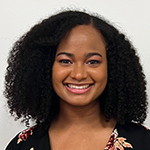
Major: Neuroscience
Currently: Masters Student
Contact: kgabriel@uab.edu
I was delighted to have taken part in the prestigious SIBMI program this summer. If I had to put my entire experience into one word, it would be metamorphic.
Throughout the summer, I had the opportunity to work with both Dr. Manrai and Dr. Patel in developing a prediction model for diabetes. We focused on finding common factors amongst diabetic patients with respect to cardiac disease and social determinants of health. Using these patterns, we began developing a machine learning algorithm that would predict the likelihood of an individual developing Type II Diabetes. Currently, I am further developing this algorithm and finding ways to implement it in the electronic health record. A great advantage of this internship is that many research mentors are happy to work with you on your project beyond the summer if you decide to do so.
In this program, you will have the opportunity to learn from world-class scientists. Each week, we heard from professors and researchers about career journeys, work-life balance, and the academic and industry fields. It was so beneficial to learn from these experts about what it is truly like to work as a researcher. I had some research experience in biomedical informatics prior to this internship, but there were some aspects of my research that were novel to me. It was great to have mentors that were willing to help me understand how to code in a new language and even went out of their way to provide resources for me.
One of the best parts of the program was meeting other students who were as ambitious and excited about science as I was. I was surrounded by highly-motivated people which encouraged me to dive into my research even more. Through the various social SIBMI events and activities around Boston, you are bound to make life-long friendships with your peers. This program is not only an amazing opportunity to broaden your network with renowned scientists and future researchers, but also a way for you to discover how your interests could be used to transform the field of medicine.
I would strongly recommend students to apply for this amazing program. I would be happy to answer any questions you may have, so please feel free to contact me!
Isuru Herath
Undergraduate Institution: Cornell University
Major: Chemistry
Currently: Senior
Contact: ish9@cornell.edu
Taking part in the SIBMI program was a truly transformative experience. It was one of the most professionally and academically enriching summers I have had, and I am extremely grateful for the SIBMI staff as well as the DBMI faculty for making it possible.
Starting with the lectures, not only were they very effective in giving all the interns a comprehensive understanding of the field of biomedical informatics, they allowed us to talk to world-leaders in the field. In addition to giving very informative lectures, they all offered invaluable career and life advice, that I will keep with me long into the future. All of the lecturers seemed very much invested in each of our careers as they provided us with ways to contact them even outside of lectures and often talked to us informally over lunch.
I had the opportunity to work with Guadalupe Gonzalez in Dr. Marinka Zitnik’s group, where I was able to learn so much about the field of drug development and how computational methods can be used to effectively accelerate it, all thanks to the phenomenal mentorship of the group members. My project involved analyzing and processing transcriptomics data, which will be used to train a graph neural network-based model to predict a set of target genes for a therapeutic to treat genetic perturbations caused by a given disease. Through this experience, I learned how to systematically take a concept for a machine learning model for a novel task and turn it into a final product. This involved iterating through cycles of staying up-to-date with the literature and implementing certain components of the model. I am still in Dr. Zitnik’s group and continuing to work on this project.
Through SIBMI, I was also able to create many lasting friendships and got to share wonderful experiences with the other interns thanks to the social events organized by the SIBMI staff. I think all the members of the cohort were able to learn a lot from each other as we each came from a different background. I could not recommend this program enough to any undergraduate who is interested in the intersection of medicine and computation.
Please feel free to reach out to me if you have any questions about the program. I would be happy to discuss it further!
Nicholas Ho
Undergraduate Institution: Arizona State University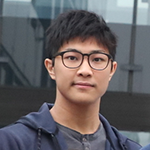
Major: Mathematics and Computer Science
Currently: Senior
Contact: nichola2@asu.edu
I am incredibly grateful to have been a part of SIBMI 2022 - the first year SIBMI was in-person since COVID-19. Susanne, Erica, and the SIBMI team have truly made this summer internship an invaluable and career-defining experience for me.
I had the amazing opportunity to work with Professor Marinka Zitnik on developing a deep learning model to predict novel-drug-drug interactions. As a computer science and math major interested in advanced mathematics and cutting-edge machine learning used for drug development - this project was everything I could have ever wished for. Not only was the masters student I worked with - Yepeng Huang - one of the best collaborators I could have had, Marinka also provided amazing guidance throughout the project.
I also got to meet wonderful individuals who also shared a greater interest and passion doing incredible research to push the frontiers of healthcare. I made great friends who enabled my boba tea addiction, who had 2-am discussions about hypothetical healthcare frameworks with me, and who supported me in countless other ways.
I never thought a summer research experience like this would help expand my horizons and exceed my expectations in so many ways. But after these two months, I'm much more confident in what I'd like to do and where I'd like to be.
Feel free to reach out!
Kira Nagoshi
Undergraduate Institution: Harvard College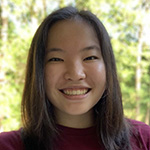
Major: Applied Math
Currently: Junior
Contact: klnagoshi@college.harvard.edu
I really can’t speak highly enough of the experience I had as a SIBMI intern this past summer. I worked in Dr. Farhat’s lab under the direct mentorship of Sanjana Kulkarni, and both were so generous with their time and energy in helping me not only build skills in data analysis but also in gaining confidence with scientific communication and in being part of a lab community.
I was also very strongly influenced by the amazing lecture series that was held throughout the program. It was such a privilege to hear from so many extremely accomplished researchers in the field, and they all came from diverse academic backgrounds, whether physicians, geneticists, or software engineers. This diversity really helped me get a sense of the huge spectrum of research areas that bioinformatics has to offer and allowed me to connect with a range of really wonderful mentors moving forward. In particular, I was able to speak individually with several of the faculty physician-investigators, and they shared with me some really wonderful insights about how practicing medicine has influenced their research; those connections have really informed my reasons for wanting to become a physician-investigator moving forward.
I wouldn’t be capturing the full picture of my SIBMI experience if I didn’t mention the amazing friends I met through the program; it was such an honor to spend the summer with such an inspiring group of peers, whether we were working together in Countway Library or hosting cheesy rom-com watch parties. I strongly, strongly recommend that anyone interested in biology, medicine, math, computer science, or anything in between apply to SIBMI, as the community of mentors and peers you gain is truly unmatched. Please don’t hesitate to reach out if you have any questions!
Satvik Tripathi
Undergraduate Institution: Drexel University
Major: Computer Science (AI and Computational Theory concentration)
Minor: Neuroscience, Psychology, Math
Currently: Sophomore
Contact: St3263@drexel.edu
“I really hope this completely blew your minds and also got the reality of the work-life balance of these tremendous people”. This was the daily mantra of the program director and the true intent of the SIBMI summer program.
The time I spent at SIBMI this past summer was invaluable. Although I was first drawn to the subject because of my fascination with the potential of computational methods in the medical sciences and patient care, I quickly realized how vast it really is. From single-cell genomics to clinical decision support, the lecture series covered it all with the help of some of the most prominent and accomplished individuals in the field. The presenters didn't just tell us about what they did; they also gave us their thoughts on the area, the difficulties they encountered, and the backstory on how and why they got into the research. Their advice and guidance on the bioinformatics profession and the many career options available to me have been beneficial as I work toward earning a doctorate in this new discipline. In addition, the program provided us with weekly lunches with the speakers, during which we were free to ask them whatever questions we wanted. The conversations I've had with faculty members have not only improved my research skills but also shaped my outlook on the world, career trajectory, and also family planning.
In terms of the research portion, I was fortunate enough to have Dr. Marinka Zitnik as a direct mentor. I was working on a novel problem of developing an approach for the tasks of response discovery and perturbation discovery in a PPI model. I was building state-of-the-art Deep Learning baselines to compare with our methodology. Marinka and I worked closely together, and I updated her on my weekly progress. In addition to sharing her knowledge and experience, she also supported my efforts to develop my own ideas. I met everyone in the lab through the weekly meetings and social outings, and it was an exceptional experience working with so many brilliant minds. Since I gained so much experience and knowledge in the technical aspects of research while working on this project, I have kept my position even after SIBMI concluded.
Interactions with other students were the key highlight of my summer, the program introduced me to nineteen very bright people who shared my enthusiasm for AI in Medicine and my erratic sleeping habits. Our shared interests in machine learning, late-night talks, going out, and summertime in Boston proved to be fantastic icebreakers. There were several times when we had a good chuckle over a nerdy research meme or an inside joke that could have occurred only amongst us. Moreover, our TA, Shandu helped us from settling in at HMS to planning amazing trips throughout our time! Therefore, if this seems like the kind of people with whom you would like to spend time and if these are the kinds of activities that interest you, then you should definitely apply.
Following the summer, I returned to school with a renewed commitment to my research in biomedical informatics and a special interest in precision medicine. After learning about the applications of EHR and Genomic data, I joined the Precision Medicine Institute at UAB with Dr. Matt Might. I also started my own research about the role of AI-based Radiology in precision medicine. Overall, this program was the finest chance I could have had, and I would suggest it to anybody looking for a rigorous and enriching summer experience. I had my mind pretty sufficiently blown.
Overall, at the heart of SIBMI is Susanne and the rest of the SIBMI crew, who just put in all their love and efforts to give us the maximum exposure that they can. And I believe this program is on its way to producing one of the most impactful scientists in the coming time. Honestly, I could go on and on about this. You may get in touch with me if you're interested in learning more, and I'll be glad to answer any questions you may have and give you the full, enthusiastic sales pitch. You can email me and we can set up a time to chat, and if you live in Philly, maybe for a cup of coffee!
Jonathan Williams
Undergraduate Institution: Stanford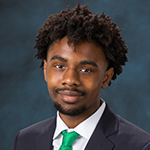
Major: Computer Science
Currently: Sophomore
Contact: jonwill@stanford.edu
I cannot overstate the impact SIBMI 2022 left upon me. A round of applause must be given to Susanne, Erica, Shandu, and the rest of the program staff involved!
I was fortunate to work in the Rajpurkar Lab. At a high level, our project was focused on building a Vision Machine Learning model to detect misplaced ET-Tubes in patients. I found it fascinating that when constructed in a sound manner, a vision model can yield accurate inferences from grayscale Chest X-Rays (which looked very similar to my untrained eye)! My peers within the lab - Ryan and Vish - made my summer experience unforgettable. Iron sharpens Iron, and I truly feel that we grew our technical and communication skills through constant collaboration. Moreover, my project mentor - Henrick - was simply fantastic. Through his close guidance, I was able to make clear progress toward realizing short & long-term project goals.
Although it may sound cliche, the aspect of SIBMI I loved most were the people. In a very short time, I was able to establish meaningful friendships with peers from across the country! The diversity of our backgrounds ensured that the conversations we had on our weekend outings (ex: Kayaking, Spectacle Island, North Station, etc.) were never dull! I further gained enrichment from the lectures delivered by various DBMI professors. It was valuable to learn 1) about their cutting-edge work and 2) how they managed to navigate academia and arrive at their current appointments.
If you feel even the slightest inkling that you may want to pursue graduate school, you must apply to SIBMI. Because of my participation, I now know without a shadow of a doubt that I will pursue a Ph.D. I am more than happy to answer any questions/address any concerns from applicants.
Julian Zulueta
Undergraduate Institution: MIT
Major: Biological Engineering
Currently: Senior
Contact: jzulueta@mit.edu
As a biological engineer, I greatly enjoyed the SIBMI program since it helped contribute to my own academic and personal growth. Each week provided me with lectures to explore different perspectives of bioinformatics—using social media for healthcare discovery, predicting at-risk cancer patients, or exploring the future of medicine with wearable devices. Additionally, outside of lecture, I had the opportunity to help build an online platform, Vitescce, that provides visualizations (i.e. dot plots or t-SNE plots) for spatial single-cell experiments. To achieve this, I was proud to be a part of Nils Gehlenborg’s laboratory, where my supervisor, Mark Keller, helped me to work towards these goals.
Yet, for me, what is unique about this program is that it was not only focused on research but on building a community. Throughout the entire program, we had internship bonding events through kayaking, weekday ramen excursions, or trips to Revere Beach. It focused on building relationships with other students throughout the country, and still connect with them even after the program.
This summer ultimately helped me solidify my decision in pursuing a career in this field, and experience a reality I aim to be a part of. I found it exciting to be at the forefront of bioinformatics, and be a part of a program that also focused on letting me explore the roles of physician-scientists. I am excited for my future as I apply to medical schools this year, and I am grateful for Harvard’s SIBMI Program in helping to make this possible.
Year of Participation: 2021
Samantha Chin
Undergraduate Institution: Princeton University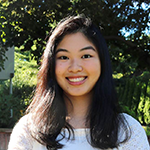
Major: Pre-med Computer Science
Currently: Junior
Contact: sc73@princeton.edu
As a pre-med computer science major, I cannot think of a better program to explore my interest in biomedical informatics. The SIBMI program provides both breadth and depth; not only did I get to learn about cutting-edge research from experts in their fields, but I also had the opportunity to do hands-on research in an area specific to my interests. I worked in the lab of Dr. Raj Manrai on a project comparing direct and indirect statistical approaches to computing reference ranges for common laboratory analytes in pediatric populations. Raj is a fantastic mentor who provided invaluable insight and guidance, and I am excited to continue my work with his lab beyond the summer.
Moreover, the SIBMI program stands out to me because I learned not only about research, but also about personal and professional development. A highlight of the lectures was hearing from successful researchers about their journeys to their chosen fields and how they maintain a work-life balance today. We also met alumni of the SIBMI program whose advice was instrumental in helping me ascertain the academic path I want to pursue going forward.
Finally, although the program was primarily virtual, I was fortunate to be living in Boston and got to meet up with other interns throughout the summer! From sailing on the Charles River to grabbing cannolis at Mike’s Pastries, I had an amazing time getting to know my peers. I loved being surrounded by a diverse group of students with similar academic interests as myself, especially in a smaller (yet growing!), and I know we’ll keep in touch beyond the end of the program.
SIBMI is a once in a lifetime opportunity, and I strongly encourage you to apply if you have even the slightest bit of interest! The amount of care that Dr. Churchill and the SIBMI staff put into the program make it so special, and I wouldn’t have wanted to spend my summer any other way. If you have any questions or would like to chat about my experience in the program, please reach out – I would always be happy to talk!
Justin Du
Undergraduate Institution: Yale University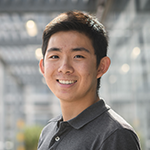
Major: Economics and Biology
Currently: Junior
Contact: justin.du@yale.edu
SIBMI dramatically exceeded my expectations in many aspects. I was able to contribute substantially to a project despite the program only being 8 weeks; I formed many friendships and learned much from other talented students with similar research interests; and I was exposed to an ocean of other fascinating innovations and research areas from the dozens of speakers we had throughout the program. As an undergraduate who came in unsure of what I wanted career wise, I left even more uncertain, but more confident in what was important to me and how to pave my own path. The support from research mentors, SIBMI staff, and Dr. Churchill is unparalleled.
Over the summer, I worked with Dr. Maha Farhat in collaboration with Dr. Evan Koch in the Sunyaev Lab to study the effects of environmental and genetic factors on COVID outcomes in Bahrain. Not only was I astounded by how I was able to work on such a project (COVID data is extremely hard to obtain, especially both viral and demographic information together), but I was also amazed by the opportunity to interact with investigators from both Harvard and the Bahrain Ministry of Health. Not only do you get to grow in your computational skills and gain exposure to a wide variety of cutting edge research, but you also receive the support from the other SIBMI students as well as the alumni of the program, who are very passionate about their work and very eager to share their experiences and knowledge with you.
Please reach out if you have any questions!
Clara Kim
Undergraduate Institution: Wellesley College
Major: Economics and Biology
Currently: Sophomore
Contact: tk2@wellesley.edu
SIBMI was a truly transformative and inspiring experience in my academic and career journey. I learned so much about the ongoing and potential roles of computation in biomedicine and healthcare and came out feeling more excited about biomedical informatics than I ever had.
This summer, I worked with Dr. Peter Park on detecting and benchmarking repeat regions in cancer genome sequencing data. In the process, not only did I develop essential bioinformatics skills, but I also grew into a more independent researcher. My mentors constantly asked questions like, “What do you think?” or “What would you do?” and encouraged me to test out my own hypotheses and approaches.
During our daily lectures, we heard from cutting-edge researchers about their exciting projects ranging from clinical informatics, to AI in healthcare, to single-cell transcriptomics! Our speakers also shed light to the unique roles that MDs, MD/PhDs, and PhDs can play in the field, and how their academic and professional paths have led to their current work. Discussions about different career paths and work-life balance allowed me to envision the role I want to play in the field.
This program would not have been possible without Susanne and the wonderful SIBMI staff. They ensured that all summer interns had access to plenty of resources within our labs and through our lecturers. Even via a virtual platform, they helped foster a sense of community within our cohort; I met so many like-minded and passionate friends and genuine mentors, whom I hope to stay close to in future years.
I encourage everyone interested in computation, data science, medicine, biology, or anything in between to apply to SIBMI! I’d be happy to answer any lingering questions, so please feel free to reach out!
Karan Luthria
Undergraduate Institution: University of Maryland Baltimore County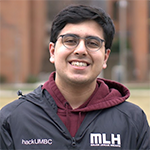
Major: Bioinformatics and Computational Biology
Currently: Senior
Contact: karanl1@umbc.edu
The Summer Institute in Biomedical Informatics (SIBMI) has been one of the most memorable experiences in my undergraduate career. Despite being virtual, Dr. Churchill, and the staff remained committed to making every day a new learning opportunity and enabled us to make valuable connections with our peers and mentors.
Over the past two summers in SIMBI, I worked in the Gehlenborg Lab with Dr. Drashko Nakikj. Here, I designed and developed front-end visualizations for clinical tools and look forward to continuing this work into the school year. Dr. Gehlenborg and Dr. Nakikj were great mentors. They were easily approachable, providing regular feedback and guidance on my projects. They gave me the flexibility to explore new ideas and be an independent researcher. But most importantly, they tailored my summer experience towards my career goals and interest and continue to remain invested in my success.
One of the most unique aspects of SIMBI was the daily lectures by DMBI faculty here at Harvard. Learning about the plethora of bioinformatics projects exposed me to just how many ways computer science can be used to make groundbreaking medical discoveries. These lectures were not only tailored towards research but also provided insight into what their lifestyles and work-life balance entail, whether that would be in industry or academia.
I simply cannot recommend this learning experience enough, and if you have any questions, feel free to reach out via email at karanl1@umbc.edu.
Owen Queen
Undergraduate Institution: University of Tennessee, Knoxville
Major: Computer Science and Math
Currently: Senior
Contact: owencqueen@hotmail.com
My experience in SIBMI was absolutely incredible! I have grown immensely as a result of my participation in this program, and I cannot thank the SIBMI staff enough for their incredible efforts to make this an impactful experience even in the virtual environment.
This program gave us direct access to some of the world’s top biomedical and computational researchers through our daily lectures. I learned so much about the broad and diverse field of biomedical informatics, including many fields and research topics that were completely new to me. Even as undergraduates, all of our incredible speakers were willing to offer their mentorship and advice; I was even able to meet privately with some of our speakers to discuss their research. This summer gave me the chance to explore my interests in this rapidly-growing field, and I was able to narrow down my research interests to pursue in graduate school.
My mentor, Dr. Marinka Zitnik, placed me on a project where I could leverage my computational skills while also exploring new methods and subfields that I had not yet explored. My project involved developing a benchmarking system for explainable artificial intelligence algorithms in graph machine learning (ML). Even though I was relatively new to graph ML, Dr. Zitnik and the postdoc that I worked with gave me the autonomy to implement several advanced methods within our software system. This challenge taught me how to tackle complex computational problems and how to systematically read recent research papers for understanding. I continue to be involved in Dr. Zitnik’s lab, and I am still working on this project after the summer to work towards a publication!
The companionship and bonds that I formed with my fellow interns will undoubtedly last beyond the summer. Our SIBMI cohort consisted of individuals from lots of different schools and backgrounds, and we were all able to bounce ideas off of each other and grow as we explored the field of biomedical informatics. We even organized a reading group where we got together and talked about interesting research papers!
Please reach out if you have any questions about this program! I would love to chat!
Arjun Somayazulu
Undergraduate Institution: Johns Hopkins UniversityMajor: Biomedical Engineering and Computer Science
Currently: Senior
Contact: asomaya1@jhu.edu
The SIBMI program was an eye-opening and enriching experience for me. The daily lectures from faculty across the extensive Harvard biomedical ecosystem exposed me to a variety of new areas and professional trajectories, cementing my interest in pursuing a career at the exciting intersection of computer science and healthcare.
I worked on a project with Dr. Brett Beaulieu-Jones, developing interpretable deep learning models for sepsis prediction in ICU patients. Despite the challenges posed by the program being remote, Dr. Beaulieu-Jones’ wonderful mentorship made this experience a highly rewarding one. He was always accessible and involved, supporting me in everything from brainstorming future directions to discussing my career plans, and I am continuing to work on the project beyond this summer.
Finally, I gained invaluable professional advice from the program director, Dr. Churchill, as well as the guest lecturers, who were all eager to help us navigate the tough questions regarding future education and career plans. Their willingness to share their professional journeys with us helped me figure out my own plans after graduation.
I would strongly recommend this program to anyone interested in the intersection of computer science and biology. Feel free to reach out if you have questions about this incredible opportunity; I would be happy to tell you more about my experience!
Diane Zhang
Undergraduate Institution: Massachusetts Institute of Technology (MIT)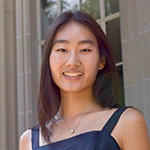
Major: Computer Science and Molecular Biology
Currently: Junior
Contact: dkzhang@mit.edu
SIBMI has been one of the defining experiences in my path in bioinformatics. I was fortunate to work with Dr. Peter Kharchenko during the summer, studying the cutting edge research of spatial transcriptomics applied to prostate cancer. The constructive feedback and mentorship made this project not only interesting to investigate, but also a formative learning experience which exceeded the scope of what I learned in the classroom.
I was impressed by the breadth and insight provided by the near-daily lectures, and I had never before had such concentrated and direct exposure to so many experts in biomedicine, who all encouraged us to ask questions ranging from technical details to general life advice. These lectures gave me the chance to reflect on my own academic and career interests, as well as parse the honest yet practical realities of different paths. I appreciate all the advice from the lecturers, program coordinators, and other students, who transformed the way I view biomedical research.
While it’s easy to get ‘lost in the crowd’ virtually, the program coordinators fostered a supportive community in which it was possible to have meaningful or personal connections and interactions, including with students, the program admin., researchers, and even program alumni. Meeting some of the other students in person was one of the highlights of my summer!
I would definitely recommend this summer program and am happy to talk with anyone interested. Please feel free to reach out!
Year of Participation: 2020
Payal Chandak
Undergraduate Institution: Columbia University
Major: Computer Science and Neuroscience
Currently: Senior
Contact: payal.chandak@columbia.edu
SIBMI is one-of-a-kind! In many ways, my experiences at the Summer Institute have been fundamental in nurturing and maturing my ideas of how computer science can be used to improve health care. The insights that I have gained from my interactions with faculty have not only furthered my abilities as a researcher but have also been instrumental in shaping my perspective of the future.
I had the wonderful opportunity to be directly mentored by Dr. Marinka Zitnik. I developed a deep learning model to predict potential treatments for rare diseases. I worked directly with Marinka and discussed my progress with her every week. She was a wonderful mentor, who simultaneously encouraged my own ideas and used her expertise to guide me. My technical skills in research grew so much during this project that I have continued to work on it even after SIBMI ended.
During our year, the program was structured so that we had a lecture from a distinguished faculty member every morning and then spent the remainder of the day working on our research projects. All of the lecturers really took the time to present their research in a lucid and engaging manner. In addition to explaining their research, they included their perspectives on the field, the challenges they faced as researchers, and many even shared their life stories and career choices with us. Since I am hoping to pursue a Ph.D. in bioinformatics, their insights about the field and perspectives on career paths have been invaluable to me.
While our program had to be organized virtually due to the pandemic, Susanne and the SIBMI staff did an amazing job of making us feel comfortable and at ease. Lectures felt extremely interactive and open despite the communication barrier that is Zoom. I was in India for the summer, and everyone was super accommodating of the time difference. I am so grateful for SIBMI because it kept me intellectually stimulated and engaged during an otherwise mind-numbing quarantine.This program has been an incredible experience, and I recommend it strongly to anyone curious about the intersection of computer science and medicine. I’m happy to answer any questions you may have about the program over email or call. Please reach out!
Nolan Cole
Undergraduate Institution: Brigham Young University
Major: Biostatistics and Mathematics
Currently: Junior
Contact: nolan.cole15@gmail.com
SIBMI was one of if not the highlight of my undergraduate education. Not only was I able to work directly with experts in spatial-omics and single cell sequencing, but I had the opportunity to hear and learn about research projects from multiple faculty members within the Department of Biomedical Informatics among others. I consider my growth as a researcher in addition to the interactions I had with 'quantitative' scientists and physicians so dedicated to improving patient health to be invaluable.
Over the summer, I worked with Dr. Peter Kharchenko and his lab to design a simulation for a spatial-omics pipeline. He and others demonstrated incredible patience and support throughout the internship. Dr. Kharchenko and his lab's commitment to improving our understanding of basic human biology and health was inspiring. I found the support I needed to excel and learn.In what has been a year of immense uncertainty, the SIBMI program director Dr. Churchill and affiliates demonstrated to me the leadership that exists within this program. Despite the internship being remote, their dedication to ensuring our success and growth was nothing short of amazing. I would encourage anyone to reach out to me if you have questions!
Conlan Olson
Undergraduate Institution: Harvard University
Major: Math and Computer Science
Currently: Senior
Contact: conlan_olson@college.harvard.edu
While our year of students was sad to not be on the Medical School campus, participating in the Summer Institute virtually showed me how engaging and impactful this program is. Even despite the obstacles presented by the virtual setting, the program provided us with amazing mentors and research projects, allowed us to hear from a wide range of experts about fascinating topics in bioinformatics, and connected us in a research community.
Over the summer, I worked with the Manrai Lab to use differential privacy to create accurate and private genetic risk assessments. I worked directly with my PI, Raj Manrai, and met with him frequently to discuss my project and possible future directions. Raj was amazing at both allowing me to choose directions that were interesting to me while providing his expert guidance on what might be fruitful. I loved how this project allowed me to connect my interests in computer science to a project that could have a real positive impact on medical care and I am continuing to work with Raj on this topic past the summer.
Outside of my project, the daily talks from DBMI faculty, affiliates, and outside invited speakers gave us an amazing stream of topics on the frontiers of biomedical research. Sometimes these talks provided concrete skills and sometimes they suggested interesting topics to explore, but they were always a great part of my day.
Finally, the advising and mentorship provided by our program director, Dr. Churchill, and other faculty in DBMI were invaluable in helping me navigate college and think about my plans for after graduation. It was great to be able to have conversations with them and benefit from their experience.I’d be happy to talk about this program; please reach out!
Naomi Rankin
Undergraduate Institution: Howard University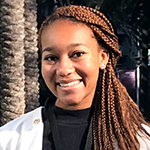
Major: Applied Mathematics
Currently: Junior
Contact: naomi@naraimax.com
My experience at SIMBI gave me incredible exposure to a world of cutting-edge research in a wide variety of interesting topics. My summer there was a virtual one, but I still feel a close connection to the people I met and worked with. I really admire the SIBMI staff for their dedication to making sure that we could still have this experience in a new format.
Every day we had speakers in the top of their fields, each incredibly friendly and open to answering questions with engaging presentations. The lab I was placed in was perfect for me. It combined my past wet lab research experience with my current interests, and I learned so much even in the short time we had together. My mentor and PI were incredibly friendly and accommodating. Although I did not get a chance to meet them in person, we still formed a great bond, and wrote an article about it for Science Magazine (When our research internship went virtual, we needed a new mentorship approach). They are very invested in my future, recommend me for opportunities, and are still dedicated to helping me succeed.
This was an incredible opportunity. If you are at all interested in anything related to the intersection of medicine and computer science, please contact me! The previous attendees were instrumental in getting me interested in this program, and I would love to do the same for you!
Harrison Zhang
Undergraduate Institution: Columbia University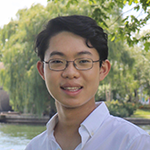
Major: Biology and Statistics
Currently: Junior
Contact:h.g.zhang@columbia.edu
The Summer Institute in Biomedical Informatics was an eye-opening and invaluable experience. Over the summer, I was exposed to countless new research areas in biomedical informatics, biostatistics, machine learning, and data science through the speakers that were invited to come and talk with us about their work. Every speaker was incredibly friendly and enthusiastic, and it was inspiring to be able to hear their perspective on how quantitative approaches will transform the way we think about biomedicine. They were also kind enough to give us advice on how to choose our own career paths.
I worked with Professor Tianxi Cai to develop and apply statistical/informatics methods to analyze electronic health records data. In particular, we developed methodology for probabilistic patient health record linkage as well as approaches for performing statistical inference using linked data. Professor Cai was an amazing mentor who was always available to talk about our research or give career advice.This was a fantastic opportunity, and I admire Susanne, Erica, and the other SIBMI staff’s enthusiasm and dedication for making this program a success. Please reach out anytime if you would like to know more about the program!
Year of Participation: 2019
Thomas Chan
Undergraduate Institution: Tufts University
Majors: Biology, Computer Science
Currently: Senior
Contact: thomas.chan@tufts.edu
The Summer Institute in Biomedical Informatics (SIBMI) program has been an integral part of my undergraduate career. Not only has the program provided me with invaluable experience in the field, it has also given me insight into the intersections of biology and computer science and its possibilities. My time at SIBMI has led to great professional and personal fulfillment, and I cannot recommend this program enough.
This summer I worked in the Gehlenborg lab, which focuses on biomedical data visualization. I developed an image processing pipeline for Vitessce, a web application for viewing spatial single-cell experiment data. I thoroughly enjoyed the work itself, the guidance offered by my mentor Chuck McCallum, as well as partnering with a fellow intern. It was extremely rewarding to work on what felt like an independent project, yet also having opportunities to collaborate with a peer.
Outside of lab, I attended weekly lectures led by faculty from Harvard Medical School’s Department of Biomedical Informatics (DBMI). These lectures made aware the multitude of career/research options as well as the varying lifestyles accompanying them. As a rising senior, This was crucial for me. I was unsure of whether I would commit myself to research, medicine, or software engineering, but the information offered was enlightening and helped me determine my next steps for when I complete my undergraduate degree.
I am also thankful for the opportunity to meet so many other intelligent interns interested in biology and computer science. Not only could we converse about our areas of expertise, but we could relate on personal levels through activities organized by SIBMI — creating a professional network of peers that’s sure to last past the end of the program.If you would like to hear more about my experiences in SIBMI and in DBMI, I’d be happy to help!
Katherine Du
Undergraduate Institution: Yale University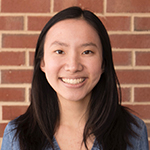
Major: Biology (quantitative track), Certificate: Statistics & Data Science
Currently: Sophomore
Contact: katherinedu.tjhsst@gmail.com
I think it’s telling that every day I’m walking to Countway Library of Medicine (our home base), I find myself smiling because this experience is truly one-of-a-kind. The Summer Institute in Biomedical Informatics (SIBMI) not only furthered my interests in scientific research, but such an immersive and intellectually-stimulating experience shaped my specific research interests going into the future. This experience at the Summer Institute was fundamental -- possibly a turning point -- in determining my academic path and career goals as well. Thus, if you are interested in quantitative research and its potential to solve problems in healthcare, biology, or medicine, the Summer Institute in Biomedical Informatics is what you’re looking for.
This program is influential in three key areas: SIBMI provides you an opportunity to work with experienced mentors who have similar research interests as you, supplements your exposure to biomedical informatics with an interactive lecture series comprised of leaders and innovators in the field, and surrounds you with a supportive community of peers and administration.
I conducted and collaborated on research with Professor Tianxi Cai, focusing on grouping medical codes in electronic health records. I was able to involve myself in the research process, teach myself concepts ranging from statistics to machine learning, as well as improve my coding and big data processing skills. The interactive lecture series not only exposed me to the breadth and depth of research questions in biomedical informatics, but it also allowed me to understand how the individuals navigated their academic paths and work-life balance. I’ve created memories with the other members of my cohort that I will treasure – whether that’s making dumplings from scratch, attending a precision medicine conference, late-night introspective talks as we stroll through Boston, movie nights where we projected films in an empty classroom, or watching the fireworks display over the Charles River. I’d love to help you decide whether SIBMI is the right summer experience for you – please reach out if you have questions.
Vineet Mathew
Undergraduate Institution: University of California, Los Angeles (UCLA)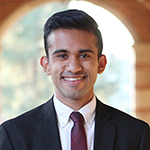
Majors: Computational and Systems Biology
Currently: 5th year of BS-MS 5 year program
Contact: vineetm122@gmail.com
If you are debating about applying to this program, just do it! I didn’t think I would make it, but am so glad I applied, and grateful that I was given the opportunity to participate in Harvard’s SIBMI.
The program is unique in the fact that it is a very holistic experience. Not only did I get my feet wet with research, but I also got to attend talks and conferences led by cutting-edge researchers who are leading the movement for using computational tools to make healthcare better for all. Interacting with these people (and really everyone in the department), immersed me in the most innovative environment I have ever been in. Being surrounded by the world’s most driven, hard-working, and brilliant people is daunting, inspiring, and humbling all at the same time.
The program does an incredible job of matching participants to mentors who have projects that are interesting and challenging, yet doable. I had the privilege to work in the Zak Lab with Dr. Kun-Hsing Yu to make a pathology slide image classification pipeline using deep learning, while simultaneously integrating genetic and proteomic data to gain more insights about the model’s predictions. Although I had brief exposure to the basic ideas of the subject matter beforehand, the learning curve was steep. However, Dr. Yu was incredibly patient and met with me every day, answering my questions and filling in the holes in my knowledge. In addition, the grad students, researchers, and other interns were all very willing to lend a helping hand. I found myself grabbing lunch with post-docs to get their advice, or seeking help from other interns late at night while cooking kung-pao chicken. I couldn’t have asked for a more supportive and non-judgmental environment to learn in. As our program director Dr. Churchill always reminded us, the summer was about the process, not the results.
I also gained much needed advice about choosing my career. Dr. Churchill, Dr. Kohane, and all the other people in the department made it an effort to be accessible to us and answer our questions about how to make some big life decisions. Transparency about work-life balance and insight into what it is really like to be a physician or a researcher (or both) was always emphasized, and I saw living proof of people who have great careers in science while having a very fulfilling personal lives. But above all, I think my favorite part of the program was the other interns. The group is small enough to get close-knit, and large enough to never have a dull moment. Our down time was spent playing games, grabbing boba, exploring Boston, cooking together, and having a good time. The relationships we built were ones that will last far into the future, and I am blessed to have met such a group of like-minded individuals. This may have been my best summer yet.
Jason Tan
Undergraduate Institution: Rice University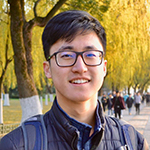
Majors: Chemistry, Computer Science
Currently: Junior
Contact: yt29@rice.edu
Needless to say, Harvard Medical School, with its surrounding hospitals and world renowned universities, is an unparalleled, biomedical research hub. The Summer Institute in Biomedical Informatics brings this endless reservoir of knowledge and mentorship right to your fingertips, and gives you the opportunity to explore this exciting and amorphous intersection of biology, medicine, and computation in whichever way you’d like.
While there is a schedule of invited speakers, I was repeatedly asked by our program director, Dr. Churchill, for more recommendations for whom we’d like to hear from. While I was assigned a mentor and a project, my mentors, Dr. Chirag Patel and Braden Tierney, followed every few lines in our first meeting with “what do you think?” and “does this sound interesting?” In fact, it seems the entire Department of Biomedical Informatics has rallied behind the idea of offering the best mentorship possible to their summer interns, as almost all faculty contribute in the form of a talk, taking on summer interns and meeting with them nearly daily, and/or simply meeting with interns to discuss life, research, and beyond. Being interested in basic science, I was extremely fortunate to work with Braden, a biology PhD student, on a project that elegantly straddled data science/informatics and wet-lab microbiology. We met with Dr. Patel (an informatician) weekly to discuss statistical methodology, then met with Dr. Kostic (a microbiologist) for insights into the biological implications of our outputs. Per the recommendations of Aparna, the “TA” for our program and Dr. Churchill, I further met with a number of PIs and graduate students from across the med school about navigating this world of interdisciplinary work.
If that isn’t enough, the remaining unallocated hours of the day were usually spent with like-minded group of biologists, statisticians, and computer scientists debating Bayesian vs frequentist statistics, attending bhangra workshops at MIT, and organizing the next weekend’s Karaoke outing!
Even after the program, the SIBMI community stays with you through program alumni eager to share their perspectives, PIs and graduate student mentors eager to hear your successes, and Dr. Churchill, a phone call away, eager to offer her years of wisdom and perspective on any personal or career related problem you may be facing.
If I haven’t convinced you to apply yet, please feel free to reach out!
Year of Participation: 2018
Becky Barber
Undergraduate Institution: Princeton University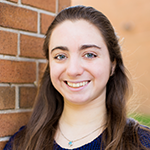
Major: Computer Science
Currently: Junior
Contact: rb25@princeton.edu
The HMS DBMI Summer Institute is unbelievably unique and afforded me an invaluable summer. For me, the mentorship at DBMI was the largest contributing factor to my positive experience. My research advisor, an expert in his field, took an hour out of every day to meet with me and discuss my project. For example, while I was preparing for the oral presentation, my mentor skyped me at night from home to help me practice. He also integrated me into DBMI by inviting me to a number of events including journal clubs and celebration lunches. Although I’m no longer at DBMI, I’m still close to my advisor – I continue to work on my summer project, and he helped me design another one for my required research at school.
Apart from my own advisor, the program director’s and coordinator’s mentorship were instrumental to my growth at DBMI. On multiple occasions, when I wanted to talk to someone about my future plans or just my life in general, I found myself sitting in the director’s office. She was an incredible listener, and I was able to forge a close bond with her – one that I know will also last much longer than the summer.
This program opened the door to a plethora of opportunities, including learning from and speaking to absolute experts in their fields. I also had the privilege of befriending and getting to know a handful of like-minded, hardworking individuals with whom I know I will stay in touch. Our cohort came from a variety of different backgrounds – computer science, math, and biology, to name a few – but we all shared a strong work ethic and a desire to learn. Moreover, despite our distinctive backgrounds, each one of us took a great deal away from the program and had a remarkably positive experience.If you are at all interested in computation and/or medicine, I cannot recommend this program strongly enough. Please reach out to me with any questions – I’m more than happy to chat with you.
Anup Challa
Undergraduate Institution: Vanderbilt University
Major: Four-Year Accelerated Graduate Program, Chemical and Biomolecular Engineering
Currently: Sophomore
Contact: anup.p.challa@vanderbilt.edu
For anyone interested in biomedical research, it becomes important to “take the plunge,” immersing him/herself within the nitty-gritty of his/her field of interest. The Summer Institute in Biomedical Informatics (SIBMI) provides just this opportunity for “quants” interested in exploring computational approaches to some of the most pertinent problems in healthcare and the life sciences.
My SIBMI experience was definitely transformative, helping me hone my critical thinking skills through participation in the investigative and didactic portions of the program. The guest lectures were tailored to a wide range of student interests and conveyed the integrative, holistic nature of biomedical informatics. These sessions were very informative, going into depth on recent advances and workflows across the field, including the application of computational insights to fascinating case studies in the biomedical space. All the speakers were amazingly enthusiastic, passionate, and interactive with our group.
The Institute is great at matching students and mentors with similar investigative interests, allowing students to complement their ongoing research with projects that captivate them. Thus, I had the privilege of working on a drug development project with Dr. Andy Beam in the Kohane lab, applying machine learning techniques to predict the risk for fetal toxicity among a cohort of small molecules commonly prescribed during pregnancy. This work was directly related to my previous experience and helped arm me with a set of new tools I can now apply to my work going forward. In fact, SIBMI is incredibly supportive of students continuing their research with their mentors past the summer, and mentors are vested in ensuring that their students achieve a fulfilling experience. Needless to say, mentorship is definitely a strong-point of this program, and mentors regard students’ interests as extremely important. Numerous times throughout the summer, I was asked, “What do you want to work on?” and encouraged to actively design my own investigation, interact with figures across the Department, and explore my curiosities by going “down the rabbit hole.”
SIBMI is truly an unforgettable experience. I am very grateful to have experienced dedicated, continuous mentorship, and to have interacted with a cohort of like-minded peers, with whom I have forged close friendships.If you are interested in investigative immersion within the field of biomedical informatics, I cannot recommend this program enough. Please contact me if you would like more information.
Arya Kaul
Undergraduate Institution: UC San Diego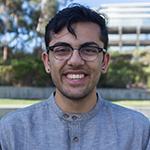
Major: Computer Science
Currently: Junior
Contact: a1kaul@ucsd.edu
My time at the Summer Institute was wonderful, and I highly recommend it to anybody who is interested in the intersection of computer science and biology. I was initially on the fence about attending due to a competing offer from a bioinformatics company; however, looking back on my experience in the Institute, I am certain I made the right choice. Your primary day-to-day work will be research, and I thoroughly enjoyed my time in the Sunyaev lab. We are still working together on one of the projects I worked on, and he has been a fantastic mentor through my grad school application process. In addition to research, you will also be attending lectures from 'wicked smaht' researchers from around the Boston area. These lectures were a great way to learn about the motley of research that is conducted at the DBMI/HMS, and highlighted the diversity of research questions that can be successfully interrogated using bioinformatics. While the research and lectures are wonderful in their own right, I cannot overstate the wonderful relationships made in the program. I am still in regular communication with everybody from my year, and they have remained an amazing support network. If you're unsure if the program is a good fit, or are deciding between the Institute and another opportunity feel free to reach out! I talked to prior attendees of the program before I made my decision, and would be more than happy to help you make your decision.
Shandu Mulaudzi
Undergraduate Institution: Columbia University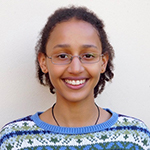
Major: Computer Science
Currently: Junior
Contact: ssm2216@columbia.edu
The Summer Institute at Harvard DBMI was perhaps the most valuable experience I have had, and will have, during my undergraduate degree. This program both provided me with an intellectually challenging environment with room for endless learning in bioinformatics and equipped me to make an informed decision about how I would like to be involved in research in the future. Being given the freedom to essentially control the direction of my own research project was daunting at first, but the difficulty of this challenge made it all the more rewarding to see it through to the end. The ability to do this, of course, was only possible because the Summer Institute ensures that each intern is paired with mentors who become invaluable resources over the summer, as my mentor was for me. Although my mentor ran her own lab, her dedication to her lab members, and the additional mentorship from graduate students in the lab, enabled me to receive crucial advice throughout the summer, on not only my research project, but also graduate school and career possibilities.In addition, every lecture and interaction with faculty at DBMI made me significantly more aware of the multiple ways in which I can choose my path through graduate school and into a career. The Summer Institute’s organizers succeeded in choosing a diverse group of researchers in the bioinformatics community to share their knowledge and career paths. Being exposed to this variety of personal and academic backgrounds, life trajectories, research focuses, and motivations for doing research, made me confident in the inclusivity of the research community, specifically at Harvard Medical School. This is an environment I would jump at the opportunity to be immersed in again, and I encourage any prospective applicants to do the same.
David Zhang
Undergraduate Institution: Cornell University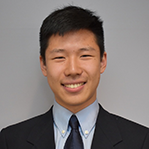
Major: Biological Sciences, Computer Science
Currently: Junior
Contact: dyz3@cornell.edu
Summer experiences, though short and brief, can be so incredibly valuable and transformative. My experience this past summer here at the HMS DBMI Summer Institute was nothing short of extraordinary. Every single week was jammed pack with experiences I will never forget. Multiple times a week, world-renowned scientists and absolute leaders in their respective fields of research would lecture and engage in intimate discussion with us. For my research, I was mentored closely by professors and researchers whose sole goal in mind was to help me learn and become a better scientist myself. They would push me to think in novel ways and never gave up when I didn’t understand something. To top everything off, this summer I met some of the most like-minded people I’ve ever encountered. I got to hear their inspiring life stories and watch them act as excited about their research experience as I was about mine. I developed close relationships with the other students in this program that I know will last for a long time to come.
Overall, this summer program exposed me to all of the vibrant and exciting areas of research going on in the field of biomedical informatics and has shown me a glimpse of what the future of medicine will look like. My experience has invigorated my passion and enthusiasm for this area of research and confirmed for myself that this is something I’d be excited to pursue as a career. The sense of community, mentorship, and tradition of pushing boundaries at the Department of Biomedical Informatics were the catalysts for perhaps the most enriching experience of my undergraduate career. If you have any doubts on whether this program is right for you, reach out and let’s talk, I’d love to help out in whatever way I can.
Year of Participation: 2017
James Diao
Undergraduate Institution: Yale University
Major: Molecular Biophysics & Biochemistry
Currently: Senior
Contact: diao.james@gmail.com
My summer at Harvard/MIT was a wonderful experience. I came in with an interest in applying computational techniques to biology and medicine, but in retrospect, I really didn’t have a clue how expansive the field is. The lecture series was a fantastic crash course in everything from single-cell genomics to clinical decision support, led by some incredibly accomplished people. Moreover, the program was kind enough to treat us to lunch with the speakers every week, where we could ask pretty much anything about their lives and careers. All of this gave me a unique appreciation for the many areas where science is moving, and a clearer idea of where my own career could fit in.
As for the research component, I was lucky enough to be matched with Raj in the Zak Lab, where I worked with clinical interpretations of genetic variants. It introduced me to the exciting world of clinical genomics: all the awesome large-scale datasets that researchers have to play with, and all the amazing things we can do with them. The other summer students were also working on great projects; in fact, most HMS/MIT labs seemed to have a track record of mentoring students to publications and inviting them to continue working during the school year.
Speaking of other students, I met 16 brilliant peers through this program, all of whom shared both my interest in computational biology and my scattered sleep schedule. It worked out great; we bonded over machine learning, late nights, and Boston in the summer. There were just so many moments when we’d laugh about some dorky joke or conversation that would only happen with this kind of group.So if this sounds like your type of crowd and these are the things that get you excited, you should definitely apply. I could talk about this forever. If you’d like to hear more, hit me up and I’d be happy to answer questions and hype it up for you.
Eliana Marostica
Undergraduate Institution: Wellesley College
Major: Computer Science
Currently: Senior
Contact: emarosti@wellesley.edu
The HMS DBMI Summer Institute afforded me unparalleled insight into the biomedical informatics research world. Experts in this field took time out of their day to teach us various topics in bioinformatics, while also sharing their own career paths and advice. Additionally, being a student in this program led to discussions with mentors, peers, and other faculty that helped me navigate an area of uncertainty: my future career. By the end of the summer, I had developed a sensible, if not comprehensive, understanding of the present state and future directions of biomedical informatics research – and my role in that future.
The mentoring I received throughout the summer is truly a hallmark of this program. The program director’s, coordinator’s, and teaching assistant’s mentorships were instrumental in my growth throughout this program, and their support and efforts were incomparable. Throughout the process of my project, my research mentors were engaged and supportive, while also giving me intellectual freedom. They met with me at least once a week throughout the entire summer and would ask me questions such as, “What do you think?” when reviewing our results. Moreover, they asked midway through the program, “Is there anything we can be doing better as your mentors?” These questions attest to their genuine, successful efforts in being fantastic mentors.
Lastly, my fellow interns were instrumental in making this program such a positive experience. We learned from each other daily and made great memories throughout Boston. To be surrounded by a diverse group of intellectual and well-rounded students hailing from numerous institutions across the country was truly a blessing.For any student interested in the medical and/or quantitative field, I strongly encourage you to consider this program. Harvard Medical School’s Department of Biomedical Informatics is a collaborative and positive environment filled with inspiring intellectuals pursuing life-changing research. I know that many years down the line, I will still look back on this experience as one of the most instrumental in my growth as a student, person, and academic.
Robert Minneker
Undergraduate Institution: University of Washington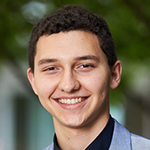
Major: Bioengineering and Mathematics
Currently: Junior
Contact: minneker@uw.eduPrior to participating in the HMS DBMI Summer Institute I had only done wet-lab research; my summer in Boston opened my eyes to a whole new world of computational work. Having the opportunity to spend a summer at HMS was one of the most enriching experiences of my undergraduate career, and I highly recommend it to anyone who is interested in combining math, computer science, and biology with medicine. I was terrified coming into the program because of my lack of computational experience but was warmly welcomed into an environment where I was supported and pushed to heights I couldn’t imagine. What makes the Summer Institute so special and conducive to learning is not just the exposure to world-class professors and researchers, but world-class peers as well. I learned a lot from the other interns and was inspired by each one of them to do more than I ever thought I could. No matter your background, if you have a passion to bring together quantitative skills to improve the way we think about, prevent, treat, and cure diseases the HMS DBMI Summer Institute is one of the most rewarding and unique experiences to do so.
Sachit D. Saksena
Undergraduate Institution: The University of Texas at Austin
Major: Computational Biology and Biochemistry
Currently: Senior
Contact: sachitdsaksena@utexas.edu
The Summer Institute research program was truly the most transformative and rewarding experience of my undergraduate career. I was able to work closely with Dr. Sebastien Vigneau in Dr. Alexander Gimelbrant’s lab in the Division of Genetics and Department of Cancer Biology at the Dana-Farber Cancer Institute. Both my mentor and PI worked closely with me on a cutting-edge project focused on implementing statistical learning techniques to epigenetic gene expression patterns. I was consistently amazed by how invested my mentors were in my progress and development, and—based on testimonials from my fellow interns—all the mentors took their roles just as seriously. They were consistently willing to work exclusively with me for hours on end, and I still can count on their mentorship now that I have left Boston. Also, this program is highly conducive to continuing work with HMS once you return to your home institution.
Besides research, Dr. Susanne Churchill and the staff that organized this program for us provided the highest quality experience imaginable. We were able to develop relationships with some of the pioneers in next-generation-sequencing, clinical decision support and medical technology, and the lectures they gave us were exciting, personal and truly mind-blowing. The lecture series opened my mind to all the roles computational biology/bioinformatics can play in the medical world, and I have renewed inspiration for my efforts in research.
I also had the chance to become very close to my fellow interns in a very short time, and I still value these friendships and connections today. Every weekend (and, let’s be honest, weekdays) we would explore the Boston area, and I truly fell in love with the town. We also got to explore Maine, Pennsylvania, New York and even Canada.
The Summer Institute was a truly immersive experience, and I am forever changed by it. I encourage anyone who is looking to give direction to their passion for science, technology and medicine to apply to this program. If you want to find out more, please get in touch with me, and I would be happy to talk for hours about this wonderful opportunity.
Teddy Younker
Undergraduate Institution: University of Pittsburgh
Major: Bioinformatics
Minor: Chemistry
Currently: Senior
Contact: younker139@gmail.com
Biomedicine is in a constant state of flux and innovation. The hardest challenge for any aspiring researcher is how to align one’s interests and passion with the experience that will allow them to thrive on that shifting landscape. The best way to do this is to get close to the source of innovation: the brilliant researchers inhabiting the intersection of biology and computer science at the HMS Department of Biomedical Informatics.
My time here was so formative. Getting placed into an amazing lab (the Gimelbrant Lab) and meeting with weekly guest speakers provided two vital things that are still shaping how I approach my future: perspective and skill exposure.
For nine weeks, I was transplanted right into the cutting edge of the field. My quantitative skillset grew immensely. Working daily with my mentor Dr. Sébastien Vigneau led me to an intimate familiarity with new cell sequencing techniques, software tools, and how to use code to manipulate massive sets of biological data. (These skills even transcended my summer project, and now I apply them at my home institution in my personal research.) In lectures and seminars, I was able to see the unfolding of beautiful work that is doing things like reshaping approaches to precision medicine and adding dimensionality to cancer genetics.
In addition to seeing where the field was currently, I got to hear how these great minds envision the future of medicine and all the new directions yet to be explored. To be an undergraduate with this kind of perspective is game changing. This collective wisdom generously imparted by Susanne Churchill, Zak Kohane, Jean Fan, members of my lab, and all the guest speakers has permanently changed how I will approach my future as a scientist.
My advice in one sentence: do it. This program can only change you for the better. And if your peer interns are anything like mine, it will feel like you are home (plus, Boston in the summer is incredible).
Email me if you need some straight-forward convincing.
Year of Participation: 2016
Rolando Acosta
Undergraduate Institution: University of Puerto Rico in Humacao
Major: Computational Mathematics
Currently: Senior
Contact: rolando.acosta@upr.edu
The HMS DBMI Summer Institute in Biomedical Informatics is the most rewarding research experience in my young academic career. The constant exposure to cutting-edge research and world wide leaders in the biomedical informatics realm really broadened my view on how much lies in the intersection of computer science, mathematics, and health. In the lab of Dr. Chirag Patel I had the opportunity to immerse myself in a highly computational project, where we had to come up with a data model and programming scripts for an exposome database. I am glad that I shared this experience with a diverse group of brilliant students and was able to make friendships that have continued after the program. Overall, the program was a wonderful experience and I strongly recommend it to anyone who wants to apply their quantitative skills to medicine. There is no better place to do so.
Susana Hawken
Undergraduate Institution: Williams College
Major: Biology & Computer Science
Currently: Junior
Contact: suswilson94@gmail.com
My experience at the Summer institute opened my eyes to the myriad possibilities in biomedical informatics for students like me. In addition to being given the chance to work on cutting-edge bioinformatics research, I, along with fellow participants, attended lectures twice a week taught by professors and experts from the Harvard Medical School, Brigham and Women’s Hospital, and other institutions in the greater Boston area. The lectures covered everything from genome editing techniques being developed to slow down aging to technology that uses news articles to track the spread of the Zika virus, as well as the subject that is of particular interest to me: the lack of diverse populations in genome databases and its effect on genetic testing for minority populations. I’ve gained a clearer understanding of the possibilities that arise from being able to navigate and analyze large amounts of biological data. My experiences at the Summer Institute and all of the amazing mentors and students I had the privilege of working with have reinforced my interest in a career in biomedical informatics.
Ben Kompa
Undergraduate Institution: The University of North Carolina at Chapel Hill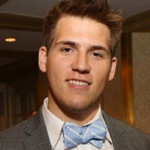
Major: Math & Computer Science
Currently: Senior
Contact: kompa@live.unc.edu
The Summer Institute was the total package. We got access to cutting edge research, incredible mentors, and the great city of Boston. I worked closely with Dr. Andrew Beam in the lab of Dr. Zak Kohane on two projects that applied machine learning to medicine. The program was flexible, yet demanding, and I could not imagine a better way to spend my summer. Every week, we listened to lectures from world class researchers. Every weekend, our class of interns explored Boston. In addition, we got great career advice from those in academia and in industry. If you want access to something, the people here will make it happen. The program is a perfect way to immerse yourself in the world of bioinformatics, genomics, and big data. I cannot recommend it enough and feel free to reach out to me with any questions.
Year of Participation: 2015
Basil Chaballout
Undergraduate Institution: Duke University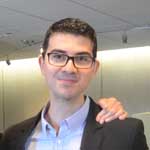
Major: Computer Science
Currently: Junior
Contact: bhc15@duke.edu
“I hope you are all sufficiently mind-blown.” This is what we were told by the program director every day and is the actual goal of the biomedical informatics summer program. As a pre-med junior currently studying computer science at Duke University, I could not have asked for a better experience – to be immersed in the hub of cutting-edge research that is bridging the gap between healthcare and technology. Better yet, I had the experience of working side-by-side with some of today’s leaders in biomedical informatics. I got to work on a completely innovative project with the thrill of knowing the project was never done before. After the summer I was set on the path of biomedical informatics and went back to school with a much stronger focus. With the experience and a tangible product under my belt, several doors have already opened and I have been able to apply the skills I learned to two coding projects outside of school. All-in-all, attending this program was the best opportunity I could have had and I highly recommend it to anyone seeking a challenging, yet incredibly rewarding, summer experience. I was sufficiently mind-blown.
Ardavan Farahvash
Undergraduate Institution: UC Davis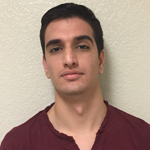
Major: Chemical Physics
Minor: Bioinformatics
Currently: Junior
Contact: afarahvash@ucdavis.edu
Attending the summer institute in biomedical informatics was a truly transformative experience for me as a student, a (future) scientist, and perhaps even as a person. Coming into the program I was unsure of where I wanted to go and how exactly I wanted to get there. Whether to obtain a MD, a PhD, or both was a thematic question that I, as well as many of my fellow students, had weighing heavily on our minds. However, as the summer progressed the picture of who I wanted to be, the work I wanted to do, and what I wanted to accomplish began to come into focus. Through listening to and interacting with the world-class researchers and research physicians at Harvard, including my own research adviser, I was able to grasp some level of perspective on the paths and careers available to those interested in biomedical informatics. That perspective, from people who had already walked all the different paths that I was now considering embarking upon, was something I desperately needed, and I will forever be grateful to the BD2K program and its administrator Dr. Churchill for providing me with such a wonderful opportunity. I strongly recommend the program for those who are interested in research and in exploring the intersections of medicine with quantitative subjects, but are perhaps unsure of how exactly they wish to pursue those interests.
Fong Shun (April) Lo
Undergraduate Institution: Johns Hopkins University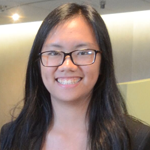
Major: Biomedical Engineering, Applied Math and Statistics
Minor: Computer Science
Currently: Senior
Contact: aprilfslo@gmail.com
The HMS BD2K Biomedical Informatics program gave me what was easily some of the most rewarding nine weeks of my life. I worked and learned with fifteen like-minded peers, all as eager as I am to use computer science, math, and engineering skills to improve the biomedical world. We had the unparalleled opportunity to hear, learn from, and collaborate with the world’s leaders in big data bioinformatics and genomics. We found out we are needed when there are more problems than solutions and ideas are simply waiting to be formed and executed. We became friends over ideas for improving the biomedical data space, all while performing focused research, gaining valuable skills, and not forgetting to explore the city of Boston! Just as importantly, we connected with researchers of all levels to gain mentorship and insight into academia, clinical research, and the biomedical industry.
Year of Participation: 2014
Kate Lachance
Undergraduate Institution: Dartmouth College ’15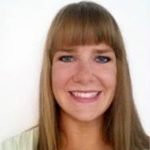
Major: Biology and Computer Science modified with Math double major
Currently: Harvard Medical School Bioinformatics and Integrative Genomics (BIG) PhD Program G1
Contact: katherinelachance@g.harvard.edu
I had a wonderful time during my summer as a BIG summer student; I had never really been able to devote myself to research full time, and Harvard was an amazing place to be able to do so. With my work in Dr. Peter Kharchenko’s lab, I had the opportunity to learn cutting-edge techniques in processing single-cell RNA-seq data. Perhaps more importantly, though, I was exposed to the amazing research community Boston has to offer, from the graduate students and post docs working along side me in the lab, to the vast resources of Harvard, MIT, and the Broad. It is in large part because of the BIG summer program that I applied for the Harvard BIG (Bioinformatics and Integrative Genomics) graduate program, which I am just starting but already loving!
Year of Participation: 2013
Naomi Nkinsi
Undergraduate Institution: University of Washington, SeattleMajor: Cellular Molecular Biology and Public Health
Currently: Senior
Contact: Naomi.nkinski@gmail.com
I am a current senior at the University of Washington in Seattle and am double majoring in Cellular Molecular Biology and Public Health. I participated in the BIG summer program the summer after my freshman year in college and found it to be the gateway to numerous opportunities both in research and in clinical study. During my time with the BIG program, my project was focused on increasing the amount of health data retrieved from Francophone Africa through the use of data mining and curation methods, specifically focusing on information about infectious disease outbreaks in these regions. My project has contributed to a vast collection of health metrics that are currently being used to monitor events such as the current Ebola outbreak in West Africa. This system also allows both the general public and health organizations like the CDC to keep track of the health of some of the most at risk communities. This project served as an amazing internship experience that at the end of the summer extended into a job offer. I still currently work at HealthMap remotely from Seattle as a paid intern and have been building on my project since my summer with BIG. This research program allows students to meet and interact with those at the top of their fields and conduct independent projects that not only create new knowledge, but help build skills that can’t be cultivated in a classroom environment. Students who take part in the BIG program are uniquely challenged alongside the brightest of their fellow students through participation in talks and research presentations and build lasting relationships with other participants. I would highly recommend this program for those who yearn to be challenged intellectually and seek not just to excel in their classwork, but in a research or clinical environment as well.
Year of Participation: 2012
Jeff Gerold
Undergraduate Institution: Washington University in St. Louis
Major: Biomedical Engineering and Mathematics
Currently: Harvard Medical School Bioinformatics and Integrative Genomics (BIG) PhD Program G3
Contact: jgerold@fas.harvard.edu
For an undergraduate student who was passionate about science but searching for the right path among graduate school, medical school, and other career possibilities, the BIG summer program was a tailor-made experience. First, I was able to pursue bioinformatics research in transcriptional regulation under the direction of Professor Martha Bulyk. Second, I had the chance to interact with a wide range of leading scientists in the Boston community; they shared not only their expertise but also reflections on their own training and careers. I learned how to rigorously apply quantitative tools to approach basic biological questions, and I learned how the diversity and outstanding work of my peers helped make the BIG community so vibrant. The program was instrumental in my decision to join the BIG PhD program the following year, where I now study evolutionary dynamics with Professor Martin Nowak.
Alex Ocampo
Undergraduate Institution: University of Michigan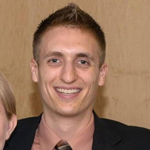
Major: Statistics
Minor: Biology
Currently: PhD student at Harvard T.H. Chan School of Public Health
Interim honors: City Year, Oak Ridge High School, FLA; Fulbright Award
Contact: Ocampo@g.harvard.edu
The BIG Program was the experience that convinced me to pursue a doctorate. I had done research previously as an undergrad, but I had not decided if a career in a quantitative science or medical science was right for me. The research project I first completed was with Professor Tianxi Cai of the Biostatistics department at the Harvard School of Public Health. That summer we used advanced statistical models to mine public health information from electronic medical records. This experience both gave me insight into how statistical tools can be applied to solve public health problems and also developed my programming skills.I participated in BIG two summers, the second as a peer leader. The second summer I worked with Dr. John Brownstein and the computational epidemiology group at Boston Children’s Hospital. Again applying the statistical toolkit I had developed the previous summer, this new research experience involved using google search queries to model malaria outbreaks globally. Both these experiences in the BIG program were the perfect stepping stone for the Ph.D. in Biostatistics I am working towards today.
Year of Participation: 2011
Yawei (Jenn) Ge, PhD
Undergraduate Institution: Brown University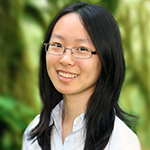
Major: Applied Mathematics and Biology
Currently: Medical Student in Health Sciences & Technology at Harvard Medical School
Contact: Jennifer_Ge@hms.harvard.edu
I attended the BIG program in the summer before my junior year of college, and it was one of the most transformative experiences of my life. It opened my eyes to the amazing power of genomics and bioinformatic and thoroughly inspired me to continue to pursue research in this direction. More importantly, though, I was exposed for the first time to the wide variety of career paths that people take that span medicine and research.I was excited to see how these two areas could go hand in hand, where clinical problems motivate the direction of research and where breakthroughs in the lab are then brought back to the clinic. As a result, I am now pursuing an MD-PhD at Harvard Medical School in order to develop a career that involves both patient care and translational research. Through its seminars, career advising, and research mentored by the leading scientists in the field, BIG offers a truly unique opportunity to learn and find what you’re passionate about!

